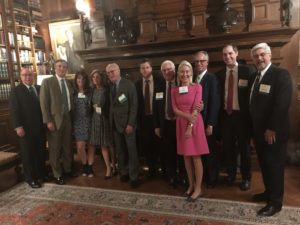Leadership & Character | New York City, NY
A group of Wake Foresters gathered over dinner in New York City on May 9, 2018 to discuss Leadership & Character.
Overview and highlights of our Call to Conversation:
- A consistent theme that weaved through the conversation was the idea of service leadership – serving something larger than yourself. On the question of when do leadership and character overlap, the group agreed that individuals committing themselves to a larger purpose most often lead with character.
- We were all enriched by accounts of character shown and the people who displayed it: people going about their work who unexpectedly stepped into trying situations and who faced the crisis or challenge with remarkable courage and selflessness — Captain “Sully” was an example; a dramatic fictionalized representation was appreciated as a model of the ideal of leadership; examples of youth doing “the right thing” in serving others even above and beyond expectations and at the expense of a more socially conventional path; professional colleagues making courageous decisions in the workplace to challenge behaviors antithetical to civil and ethical standards; political figures showing restraint in the face of antagonistic, combative verbal attacks; and family members who have set indelible examples of serving the greater good in extraordinary ways.
- We found agreement in our societal need to demonstrate and call out authentic personal character and leadership in contrast to the impersonal and cynical influence of social media culture.
- When asked, “Can we and should we teach character and leadership at Wake Forest?,” we enjoyed mixed reactions: skepticism that these values can be part of a curricula in a traditional classroom, text-book scenario and that at their core, these values must be seeded and nurtured by the family; that in-the-moment action and decision-making are where ethical behaviors are best demonstrated and instilled.
- We spoke about the importance of weaving a focus on these values into the “fabric” of the Wake Forest experience — including the classroom, literature and case studies, but also the calling-out of exemplary actions within and outside of the community; important too is an articulation of a community code of ethics and expectations of members to act, respect, seek out and model opportunities to lead with character.

